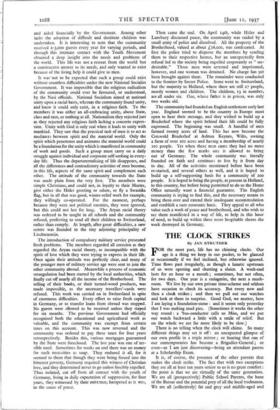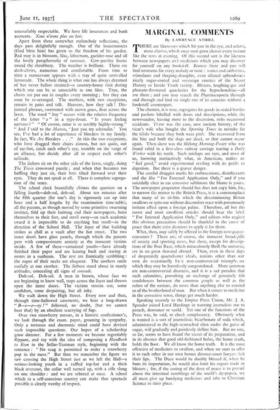THE CLOCK STRIKES
By JAN STRUTHER
There is no telling when the clock will chime. So many different things may set it off : an unexpected glimpse of our own profile in a triple mirror ; or hearing that one of our contemporaries has become a Brigadier-General ; or even—as I am just discovering—being an attendant parent at a Scholarship Exam.
It is, of course, the presence of the other parents that makes the clock strike. The fact that with two exceptions they are all at least ten years senior to us is no great comfort : the point is that we are virtually of the same generation. We are all (prospectively) Public School Parents, the bane of the Bursar and the potential prey of all the local tradesmen. We are all (collectively) fat and grey and middle-aged and unassailably respectable. We have life insurances and bank accounts. Nous n'irons plus au bois.
Apart from these somewhat melancholy reflections, the days pass delightfully enough. One of the housemasters (God bless him) has given us the freedom of his garden. Red may is in blossom, lilac, laburnum, guelder-rose and all the lovely paraphernalia of summer. Cow-parsley foams round the shrubbery. The weather is brilliant. There are deck-chairs, numerous and comfortable. From time to time a manservant appears with a tray of quite unrivalled lemonade. The whole thing is what one has always dreamed of but never before attained—a country-house visit during which one can be as unsociable as one likes. True, the chairs are put out in couples every morning ; but they can soon be re-arranged. The mothers, with two exceptions, remain in pairs and talk. Heavens, how they talk ! Dis- jointed phrases, sweetened with mown grass, float across the lawn. The word " boy " occurs with the relative frequency of the letter " e " in a type-fount. "Is yours feeling nervous ? " "Of course, mine is so terribly highly-strung." "And / said to the Matron, 'Just You try adrenalin.' You see, I've had a lot of experience of bleeders in my family. In fact, We Are Bleeders . . ." At this the two exceptions, who have dragged their chairs almost, but not quite, out of earshot, catch each other's eye, tremble on the verge of an alliance, but decide after all to respect each other's solitude.
The fathers sit on the other side of the lawn, singly, doing The Times crossword puzzle ; and when that becomes too baffling they just sit, their hats tilted forward over their eyes. They do not speak at all. There is complete segrega- tion of the sexes.
The school clock beautifully chimes the quarters on a falling fourth—doh-sol, doh-sol. About ten minutes after the fifth quarter (for one's day is rigorously cut up into hour and a half lengths by the examination time-table), all the parents, as though moved by some primitive swarming instinct, fold up their knitting and their newspapers, hoist themselves to their feet, and stroll away—on such academic sward it is impbssible to do anything but stroll;--in the direction of the School Hall. The foyer of that building strikes as chill as a vault after the hot street. The two inner door i have glass panels, through which the parents peer with compassionate anxiety at the innocent victims inside. A few of these—unnatural youths—have already finished their paper and are leaning back and staring at motes in a sunbeam. The rest are frantically scribbling : the napes of their necks are eloquent. The mothers smile ruefully it one another. The fathers stand about in manly attitudes, concealing all signs of couvade.
Doh-sol. Doh-sol. A man in brown, whose face we are beginning to know well, steps across the foyer and throws open- the inner doorS. The victims stream out, some confident, some despairing, but all inky.
We walk 'down the High Street. Every now and then, through tithe-hallowed casements, we hear a long-drawn " ! " followed, no doubt, (but we cannot hear that) by an obedient scurrying Of fags.
Over two strawberry messes, in a historic confectioner's, we look through the exam paper, groaning in sympathy. Only a tortuous and daemonic mind could have devised such impossible questions. Our hopes of a scholarship grow dimmer. For a few moments we become regrettably flippant, and toy with the idea of composing a Handbook to Eton in the Sellar-Yeatman style, beginning with the sentence : " No scug is permitted to order a strawberry pop in the mess." But then we remember the figure we saw crossing the High Street just as we left the Hall—a serious-looking youth in a ruffled top-hat and a thick black overcoat, the collar well turned up, with a rifle slung on one shoulder : and we are sobered at once. A school which in a self-conscious country can make that spectacle possible is clearly worthy of respect.

























































 Previous page
Previous page